International Policy
“On the first day of its summit in Chicago, NATO has declared stage one of its European missile defense shield “provisionally operational.”
“It is the first step towards our long-term goal of providing full coverage and protection for all NATO European populations, territory and forces,” NATO Secretary General Anders Fogh Rasmussen told reporters on Sunday. 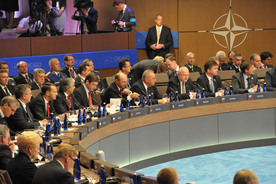
Specifically, this means that the United States has transferred command of a radar system in Turkey to NATO’s command and allowed the alliance to direct the missile defense system stationed on US ships. These ships can also be placed under NATO command. Spain, Turkey, Romania and Poland have agreed to deploy key parts of the U.S. missile defense system on their soil.
The White House says it expects initial operational capability by 2015, while the system will be fully functional in 2018. All 28 members of the alliance will participate in the financing.
The missile defense shield has created tension with Russia, which views the system as a threat. Rasmussen stressed that Russia has no influence on the sovereign decision of NATO’s member states but still invited Moscow to co-operate in discussions on the subject. German Foreign Minister Guido Westerwelle also said ahead of the summit that Russia is welcome to work on a joint security strategy for Europe: “The door remains open for Russia.” …
Article – Deutsche Welle
The European Union foreign ministers on March 23 decided to impose sanctions on a further 12 Belarusians, including businesspeople, and 29 Belarusian companies to punish the Lukashenka regime for the repression of political activists and civil society representatives, BelaPAN said.
In particular, the EU Council added the 12 persons to the 27-nation bloc’ list of those targeted by a travel ban and asset freeze, reported euroalert.net. They include individuals benefiting from or supporting the regime, as well as persons responsible for the repression of civil society and the democratic opposition in Belarus. 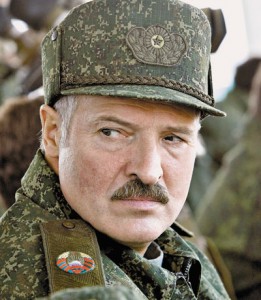
In addition, the EU Council froze the assets of 29 entities, which are controlled by persons subject to restrictive measures due to their role in supporting the regime.
“I am extremely concerned about what is happening with the civil society,” said Catherine Ashton, the EU’s high representative for foreign affairs and security policy, speaking ahead of the EU Council’s meeting in Brussels. “We have been extremely clear about the regime in Belarus that they release political prisoners. We would like to engage with them when they comply with what we have asked them to do.”
In an interview with the government`s news agency BelTA earlier this week, Andrey Savinykh, spokesman for the Belarusian foreign ministry, said that the EU should stop using pressure against Belarus if it wanted to “settle existing differences.”
Both Belarus and the EU will benefit from a “mutually acceptable settlement” of them, said Mr. Savinykh.
“The EU should in the first place drop the practice of reinforcing its sanctions on a regular basis,” said the spokesman. “The point is not about whether the sanctions are efficient. What is important is that this practice rules out the possibility of bringing sensibly and reasonably the positions closer to each other.”
On January 31, 2011, the EU Council imposed asset freezes and travel bans on 156 Belarusian government officials and other individuals for their role in “the violations of international electoral standards” in the December 14-19, 2010 presidential election and a post-election crackdown on civil society and pro-democratic supporters. The Council blacklisted more Belarusians later, placing on the list judges and prosecutors involved in the prosecution of post-election protesters, as well as the judge and the public prosecutor in the trial of prominent human rights defender Ales Byalyatski.
The EU Council`s Friday decision brought the total number of Belarusians on the blacklist to 234.
After the EU imposed travel bans and asset freezes on new Belarusian officials on February 27, the Belarusian foreign ministry “recommended” that the head of the EU delegation to Belarus and the ambassador of Poland to Belarus return to their capitals for consultations, while simultaneously recalling the country`s permanent representative in Brussels and ambassador in Warsaw.
All EU ambassadors have left Belarus since “in expression of solidarity and unity.”
Materials from BelaPAN, Naviny
Russian-NATO Cooperation in Ulyanovsk.
21 Mar 2012“Russia has suggested to NATO it could use its own airport near Ulyanovsk if Manas transit shipment centre is closed, Voice of America reported.
‘The Russian government plans to use the airport near Ulyanovsk as a transit point for NATO coalition troops in Afghanistan’, the statement said. ‘Moscow allowed NATO to supply coalition forces in Afghanistan through Russia by railway for three years. One of Russia’s airports in Ulyanovsk may be also be used to deliver military cargo’. 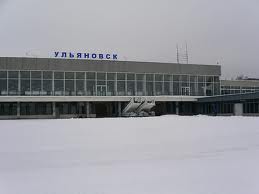
According to the plan, military aircraft will fly out of Kabul, then over Central Asia to land 3000 kilometres away in Ulyanovsk.
Russian Foreign Minister Sergei Lavrov told the Russian Duma members that the use of the airport by the NATO military is in Russia’s interest, as this will facilitate the orderly withdrawal of NATO troops from Afghanistan by December 2014 as was planned.
The agency stressed that the Russian leadership’s decision was announced the day after the Kyrgyz authorities told U.S. Secretary of Defence Leon Panetta that they did not intend to prolong the lease term of the U.S. Air Force base Manas which expires in July 2014.
Expert on security issues in Central Asia Joshua Kucera, working in Washington, thinks that this statement of the Kyrgyz leadership can simply mean that it is time to begin lease negotiations with the new president Almazbek Atambayev, Voice of America said.
Kucera said that Ulyanovsk will be a fall-back option if Manas is closed and on the other hand, Manas is a fall back option in case of overlapping the channels passing through the territory of Pakistan.”
From TREND News Agency
—
“NATO, Russia and the Central Asian’s countries have a number of common interests in the region, James Appathurai, NATO Secretary General’s Special Representative for the Caucasus and Central Asia told in an interview with atlantic-community.org.
Appathurai said he would like to reject the opinion that the West and Russia are competing for influence in the Central Asia.
“We have common interests in Central Asia. And I mean common with the Central Asian countries and NATO, and common between all three if we include Russia as well,” he said.
First common interest is the stability in Afghanistan as vital for all that Afghanistan does not once again begin exporting terrorism, extremism, or continue exporting drugs, which of course hit all, Appathurai mentioned.
“So we have an interest in stabilizing Afghanistan, shared by all of us. And the best way to do that is to cooperate,” he added.
Appathurai added that NATO, Russia, and Central Asia for example train together their counter narcotic officials, particularly Central Asian, Afghan but also now Pakistani.
Russia plays a very important role in this joint project with NATO allies, he said, and it works very well.
The other NATO’s interest in the region is to help the Central Asian countries reach their full potential, including as transit areas for trade, as production and transit areas for energy and that is a mutual interest for everybody, Appathurai added.
“The Central Asian countries are concerned that when 2014 arrives and the Alliance has a much smaller and different presence in Afghanistan, that they will be left with a problem or a growing problem of instability, and terrorism, and extremism, and drugs,” he mentioned.
The NATO is committed for the long term to Afghanistan’s stability and committed not just rhetorically or politically, the alliance will have people on the ground doing work to help the Afghans stabilize their own country, Appathurai stressed.
“We will also work with the Central Asian countries so that they can protect themselves better, fight against and defend against these many threats. So we’re going to offer them more consultation, more exercises, more joint training to help them beef up their own capacity to handle these problems,” he added.”
From TREND News Agency
Уже 20 лет без Советского Союза.
25 Dec 2011«Осенью 1991 года Россия выбрала трудную дорогу к демократии и избавилась от имперского статуса…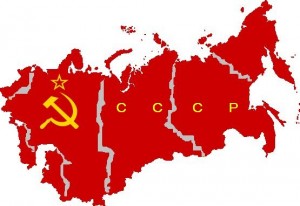
Так был ли тот выбор хорош или нет? В России до сих пор на сей счет есть разные мнения. В определенных кругах царит тоска по славному прошлому. Но лично у меня нет ни малейшего сомнения: выбор был правильным. Российский народ мудрее, чем думает о нем власть…
Если рассматривать распад СССР с материальной точки зрения, то Россия начала богатеть, только когда отказалась от империи, которая ужасно дорого стоила московской казне. Общество жило бедно, поскольку огромные финансовые средства проглатывала гонка вооружений. Но и сама по себе система плохо работала. По расчетам экспертов, сегодняшняя Северная Корея отстает по богатству от Южной в 15 раз, Восточная Германия в 1989 году отставала от ФРГ в 3 раза. А какие руины оставил после себя коммунизм!
После трагедии нацизма Германия стала мировым лидером в борьбе против фашизма, Южная Африка – против расизма. Россия не воспринимается как планетарный боец за свободу слова. Но за двадцать лет, прошедших с распада СССР, у вас выросло новое поколение, лишенное груза советской истории, и, безусловно, молодые найдут другую дорогу.
– Что бы я лично имел с того, если бы моя родина выпускала суперсовременные ракеты, а в магазинах был дефицит? – говорит мне 28-летний Александр. Он вежливо слушает ностальгические рассказы дедушки и бабушки о жизни при социализме, но не понимает их. У молодежи совершенно другая логика.
25 декабря 1991 года россияне перестали быть товарищами и стали потребителями.
Сейчас это кажется удивительным, но Запад до последней секунды пытался предотвратить гибель СССР. Как не вспомнить, насколько холодно европейские депутаты приняли у себя, в Страсбурге, Бориса Ельцина. Или речь Джорджа Буша-отца в Киеве 1 августа 1991 года, когда американский президент прямо сказал украинцам, чтобы они успокоились с их требованиями независимости.
Причины таких шагов были просты: Запад влюбился в Горбачева и не понял, что генеральный секретарь ЦК КПСС потерял контроль над ситуацией еще до августовского путча. США и Европа боялись, что Советский Союз рано или поздно превратится в огромное поле для атомной войны…
Во время осенней поездки по 12 республикам СССР мы с моим другом Альмерико Ди Мельё отчетливо видели, что жители разных частей страны находились в состоянии поиска своей идентичности, пребывали в ожидании московских решений. Симптомы неизбежного краха были уже очень заметны. Беловежское соглашение дало ответ тем, кто сомневался…
Распад СССР – одно из центральных событий ХХ века. Он не только ознаменовал конец «холодной войны» и идеологической борьбы двух систем, но и указал путь к свободе угнетенным народам на всех континентах.
На Западе есть люди, которые ошибочно думают, что падение Берлинской стены осенью 1989 года – событие более важное. Это не так…
Если бы в Кремле был не Горбачев, то страны соцлагеря рисковали бы стать участниками опасного политического сценария, как в Китае после кровавых событий на площади Тяньаньмынь. Под давлением левых идеалистов, потерявших родину «реального социализма», некоторые уже благополучно забыли, что в Германии полмиллиона советских солдат ждали приказа из Москвы. Чем обернулся такой приказ в 1956 году для Венгрии и в 1968 году для Чехословакии – всем известно… »
Статья – Джузеппе Д’Амато Московский Комсомолец № 25831 от 24 декабря 2011 г. Giuseppe D’Amato Moskovskij Komsomolets.
Former German Foreign Minister Hans-Dietrich Genscher has paid tribute to the late Czech president and anti-communist hero Vaclav Havel. Europe has lost a “great European,” Genscher says. When did you last speak to Vaclav Havel? 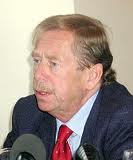
Hans-Dietrich Genscher: It was either this year or last year. We saw quite a lot of each other – even before the revolution in 1989 – but of course much more during his time in office. But we also still kept in touch after we both had left office. I had direct a contact with him for many years through two of his colleagues who worked on “Charter 77” with him.
When you first met Havel, he had already been a writer for many years. In that sense he was not a professional politician, but an artist. What role did that play in his commitment to politics?
Commitment to freedom was a way of life for him. But as a poet he was able to convey his beliefs through the power of words. And it was with the power of words that he challenged the communist regime in former Czechoslovakia and ultimately brought it to an end. He was a source of encouragement to the people of the Czech Republic and Slovakia in their fight for freedom and democracy.
Thinking back to the revolution in 1989, the image that comes to mind for many people is of Havel on the balcony of the embassy in Prague. Which image of Vaclav Havel has particularly stuck in your memory?
A whole series of images come to mind, even those taken when you could see how distressed and restricted he was by his terrible disease. And yet you could still see his fighting spirit and the courage he had shown during times of persecution. The former federal German President Richard von Weizsäcker’s first visit to the official residence of the Czech president in Prague was also particularly special because the man who was formerly persecuted could receive guests from Germany as the president of Czechoslovakia.
People often refer to a “political friendship” when the talk about the relationship the two of you shared. You have said yourself that you continued to see Havel even after your political career had ended. Was it a political friendship or was it more than that?
We were certainly in tune with one another on many basic issues, but there was also a very human affection, which probably should always be the case. It was the case here. Perhaps the fact that we had both experienced life under communist regimes played a part. He experienced it in Prague and I had experienced communism while living in the Soviet occupation zone and then the German Democratic Republic between 1945 and 1952, before I left for West Germany.
What will you miss most about Vaclav Havel?
The death of Vaclav Havel has made Europe a lot poorer. We have lost a great European and I think that many Europeans will be united in mourning today, at any rate, the Germans and the Czechs.
FULL Interview – Michael Borgers – Deutsche Welle
VIDEO – Mourning
BIOGRAPHY – France24 – VIDEO
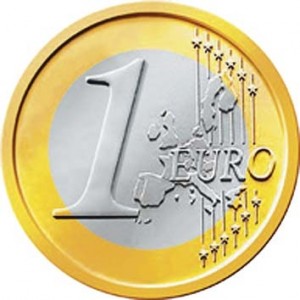 Due sono le cose: o gli europei che vivono nell’area dell’euro sono su un “Titanic” e non se ne accorgono oppure chi è al di fuori della zona della moneta unica è in preda ad un isterismo strisciante. Gli unici aspetti certi sono che il lontanissimo rischio che la situazione finanziaria continentale possa degenerare ha preso forma e i Diciassette dell’euro hanno la necessità di dover assumere con rapidità decisioni strategiche di portata epocale.
Due sono le cose: o gli europei che vivono nell’area dell’euro sono su un “Titanic” e non se ne accorgono oppure chi è al di fuori della zona della moneta unica è in preda ad un isterismo strisciante. Gli unici aspetti certi sono che il lontanissimo rischio che la situazione finanziaria continentale possa degenerare ha preso forma e i Diciassette dell’euro hanno la necessità di dover assumere con rapidità decisioni strategiche di portata epocale.
Per meglio comprendere cosa stia accadendo, tralasciando analisi di carattere economico e monetario, è opportuno soffermarsi su due momenti fondamentali: quello politico e quello culturale.
Il primo punto da evidenziare è che la costruzione europea, sorta dopo la fine della Guerra Fredda, è entrata immancabilmente in crisi in questi tesissimi mesi. Adesso i Diciassette hanno il difficile compito di edificare, in tutta fretta, l’Europa del Ventunesimo secolo, quella che – tutti noi ci auguriamo – competerà in futuro nel mondo globalizzato con altri giganti regionali.
E’ bene subito segnalare che non bisogna inventare nulla. Si sa bene quali passi compiere e quali soluzioni scegliere. Il problema è un altro: far approvare questo complesso piano di riorganizzazione da tutti i membri e metterlo in pratica in men che non si dica. In buona sostanza, se si vorrà far sopravvivere l’euro gli Stati nazionali saranno costretti a cedere – a vantaggio delle istituzioni comunitarie – ulteriori quote di sovranità, dopo quella monetaria alla Banca centrale europea nel 2002.
Il processo di unione politica, che ha segnato un passo falso con la bocciatura della Costituzione continentale (poi rimediato parzialmente con la successiva “mini -Costituzione”), è destinato a ripartire con veemenza e giocare ora un ruolo centrale. Il dubbio è se i singoli Stati dell’area euro sono pronti a questo sacrificio. Le resistenze saranno assai forti, ma l’Europa sta pericolosamente avvicinandosi ad un precipizio.
Se salta il banco tutti indistintamente ci rimetteranno e non poco. Secondo il presidente della Commissione Barroso ogni singolo Paese perderebbe il 50% del suo Pil. Come riferiscono alcuni specialisti il marco di apprezzerebbe del 40% il giorno stesso della sua riapparizione e la lira segnerebbe un meno 60%. In questo modo gran parte dell’export tedesco perderebbe competitività con spaventose ripercussioni interne. La Germania si ritroverebbe una “Cina” supertecnologica (leggasi Italia) in mezzo al Vecchio Continente, come avvenne tra il 1994 ed il 1995, quando una bottiglia di vino italiano costava nei supermercati tedeschi meno di mezzo litro di birra bavarese.
L’Europa si appresta ad affrontare contemporaneamente anche una rivoluzione culturale. Come si ricorderà la nascita dell’euro ha rappresentato il compromesso perfetto tra la Germania, che rinunciava al marco, ed il resto dei membri Ue, che temevano per la riunione tedesca. Ci volle un decennio per far quadrare il cerchio e partire con la moneta unica, che è stato soprattutto un evento politico. Dal 2002 la Bce, con sede giustamente a Francoforte, ha seguito fedelmente linee guida simili a quelle che avevano ispirato l’azione della Banca centrale tedesca per tutto il dopoguerra. Ossia lotta all’inflazione e moneta forte. Gli incubi iperinflattivi dei tempi della repubblica di Weimar rimangono ben presenti nei tedeschi di oggi. Ma ora quel tipo di scelta assai rigido non sembra più rispondere alle esigenze dei tempi.
Se si vogliono “fare gli europei” i tedeschi dovranno per necessità diventare più flessibili, mentre gli italiani più quadrati (maggiormente rispettosi delle leggi) e i francesi meno arroganti. Altrimenti il rischio è che ognuno vada per conto suo e subisca in futuro la globalizzazione dei colossi asiatici ed americani.
Giuseppe D’Amato
La Russia ha intenzione di dislocare propri missili e sistemi informativi sofisticati nell’enclave di Kaliningrad sul Baltico, in Bielorussia e nella regione meridionale di Krasnodar se il negoziato con gli Stati Uniti per il cosiddetto “Scudo spaziale” europeo non desse risultati positivi. 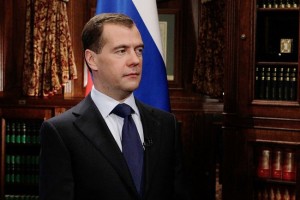
Mosca non è così sicura che gli occidentali vogliano costruire questo mantello per difendersi da eventuali lanci iraniani. Il vero obiettivo segreto, si teme al Cremlino, potrebbe essere proprio l’ex superpotenza comunista.
L’annuncio di Medvedev giunge in un periodo davvero complicato. Da mesi russi ed americani stanno trattando dietro alle quinte sulla creazione di un sistema di difesa antimissilistico comune europeo. Le reciproche diffidenze non permettono, però, ancora il passo decisivo che porti ad un accordo, la cui data ultima sarebbe fissata prima del vertice Nato di Chicago del maggio 2012. In caso di fallimento vi è il rischio di una prossima nuova “Guerra Fredda”.
A cui, tuttavia, sono in pochi a credere. Uno dei principali meriti della presidenza Medvedev in politica estera è stato proprio lo scongelamento dei rapporti con Washington dopo il gelo tra Bush e Putin. Il capo del Cremlino uscente sta ora semplicemente battendo i pugni sul tavolo per difendere le richieste russe davanti ai troppi “no” americani.
Secondo gli specialisti militari gli occidentali non hanno alcuna intenzione di abbandonare i loro progetti sullo Scudo europeo. E se Mosca desse seguito alle sue minacce commetterebbe un errore strategico imperdonabile isolandosi e buttandosi tra le braccia della Cina.
La dichiarazione di Medvedev va letta anche in chiave di politica interna. Il 4 dicembre si vota in Russia per le legislative e, stando ai sondaggi, le cose non vanno secondo i piani del Cremlino. La sua formazione, Russia Unita, dovrebbe vincere le elezioni, ma non in maniera così convincente come Putin e Medvedev sperano. I fischi al premier, allo stadio moscovita Olimpiskij, sono stati un campanello d’allarme, suonato anche in altre città. La crisi economica, importata dall’Occidente, si inizia a sentire e le misure fin qui adottate paiono essere non convincenti.
Giuseppe D’Amato
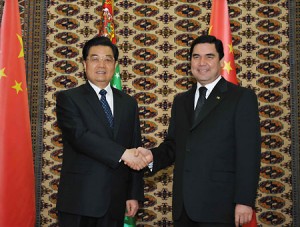 Relations between Turkmenistan and China are long-term and strategic. “These relations stood the test of time, proven their efficiency and now are a major factor of stability and development in the Eurasian space,” President Gurbanguly Berdimuhammadov said in an interview before his official visit to Beijing.
Relations between Turkmenistan and China are long-term and strategic. “These relations stood the test of time, proven their efficiency and now are a major factor of stability and development in the Eurasian space,” President Gurbanguly Berdimuhammadov said in an interview before his official visit to Beijing.
In December 2009 Turkmenistan-China gas pipeline was commissioned. “This is an outstanding event. This project is of strategic importance for both sides, meets long-term interests of Turkmenistan and China, as well as logic of global economic development, in which energy supplies play an increasing role,” Berdimuhammadov told Chinese journalists.
The Turkmen leader stressed that Ashgabat jointly with Chinese partners is working on further increase in the supply of Turkmen gas to Beijing in view of increasing demands in China’s economy and great opportunities of Turkmenistan’s resource base. “China is not just a huge and great country, a powerful global economic and industrial centre, a vast and promising market for Turkmenistan. It is a reliable and trusted friend,” Berdimuhammadov highlighted.
At the same time China is ready to work with Turkmenistan to create a good environment for their business cooperation. Cooperation between the two countries has seen achievement in economic, trade, energy, transportation and other fields in recent years, Chinese Vice Premier Wang Qishan told at a business forum.
In last weeks Ashgabat issued an angry response to Russian scepticism over the size of its natural gas reserves and reinforced its ambition to find new energy markets in Asia and Europe that will cut its dependence on the Kremlin. BP data ranks natural gas reserves in Turkmenistan, a Central Asian nation of 5.4 million, as the world’s fourth-largest. The country is seeking alternative export routes to meet its goal of more than tripling natural gas output by 2030.
Auditor Gaffney, Cline & Associates has ranked the South Iolotan natural gas field as the world’s second-largest after South Pars in Iran, saying last month it could contain between 13.1 trillion and 21.2 trillion cubic metres. But Alexander Medvedev, deputy chief executive of Russian gas export monopoly Gazprom, called these estimates into question. “I believe that there are no grounds … and no reason to make such statements that there is such a natural deposit with reserves of this scale,” Medvedev said.
Ashgabat, at odds with Moscow over its plans to export gas to Europe, issued a strongly worded statement, expressing “bewilderment over the biased assessment by a professional” and calling Gazprom‘s remarks “utterly tactless”. Turkmenistan has expanded gas exports to next-door Iran and launched a pipeline to China. It has also won strong support from the European Union and the United States for plans to supply gas to a trans-Caspian pipeline that will run to Europe via Azerbaijan.
Turkmenistan’s annual natural gas output is estimated to have averaged around 70 billion cubic metres in the 20 years of independence from the Soviet Union. Turkmenistan aims to produce 230 bcm of the fuel annually by 2030.
(Sources – Xinhua, Reuters, Trend)
 «…“La festa è finita!” То есть “праздник закончился”. Американцы употребили бы известное выражение “game over”, а французы, как в казино, “les jeux sont faits”. Целая эпоха уходит в учебники истории. И это не только сам премьер-министр Италии Сильвио Берлускони, самый большой друг России на Западе, — это вся “вторая республика”, родившаяся после окончания “холодной войны” в начале 90-х годов, тает как снег на солнце.
«…“La festa è finita!” То есть “праздник закончился”. Американцы употребили бы известное выражение “game over”, а французы, как в казино, “les jeux sont faits”. Целая эпоха уходит в учебники истории. И это не только сам премьер-министр Италии Сильвио Берлускони, самый большой друг России на Западе, — это вся “вторая республика”, родившаяся после окончания “холодной войны” в начале 90-х годов, тает как снег на солнце.
Все ныне происходящее — вполне в характере итальянцев, которые, как и россияне, любят действовать в последний момент. Именно теперь, в экстренной ситуации, они будут реформировать свою страну; делать то, чего не сделали с 1994 года. Родина и Европа в опасности! Тянуть резину больше нельзя. Сегодня Италия на грани политической и социальной революции…
Нередко возникает нелегкий вопрос: насколько такие политики, как Берлускони или Путин, сильны? Или просто их оппоненты слабаки? Что касается России, то дайте себе ответ сами. А в Италии за последние двадцать лет было всего два настоящих лидера — Сильвио Берлускони и Романо Проди. Второму его же союзники практически не дали работать и даже предпочли послать его в Брюссель, где он достойно исполнял функции председателя Еврокомиссии с 1999 до 2004 года. Два раза Проди побеждал Кавалера, и дважды ему приходилось уйти в отставку (в 1998 г. и в 2008 г.). Второй раз, mamma mia!…
Историки еще долго будут обсуждать, что же это такое — «берлусконизм». Что-то похожее на «перонизм» в Аргентине, но с преобладанием буржуазных корней? В нем присутствовали и смешивались типично социалистические элементы с традиционным консерватизмом итальянского общества и популизмом. Культ личности представлял собой центр притяжения этого движения. Было удивительно, что рабочие и предприниматели, десятилетиями стоящие на противоположных позициях в классовой борьбе, голосовали за одного кандидата, то есть за Берлускони…
Прекрасно помню дни встреч «Большой восьмерки» в Генуе в июле 2001 года. Буш, Путин и Берлускони (все — новички) не могли найти себе места, когда другие мировые лидеры, уже давно знакомые между собой, выстроили перед ними нечто похожее на забор в личном общении. Как хозяин саммита, в Генуе Берлускони заложил фундамент для того, чтобы в мае 2002 года в Пратике Ди Маре Россия и НАТО подписали соглашения о сотрудничестве и создали совместный совет. Потом, в следующие годы, Кавалер неоднократно публично выступал как «адвокат» Москвы. И слава Богу, что он помог остановить военные действия в Грузии в августе 2008 года.
Благодаря его предпринимательскому инстинкту экономические отношения между нашими странами вновь расцвели после сложных 90-х. Компании «Эни» и «Газпром» стали стратегическими партнерами, и на мировых рынках с ними пришлось считаться. Хоть самое важное соглашение в энергетической сфере было подписано все же Проди. Отношения Италии с Россией при Берлускони были хорошими в разных сферах. Даже на социальном уровне был заключен государственный договор об усыновлении российских сирот.
Так что будущего не надо особенно бояться. Сегодня Италия и Россия имеют совместную комиссию, поэтому высокий стандарт межгосударственных отношений будет гарантирован. Просто наверняка в них будет меньше пафоса.
В то же время ясно другое. Владимир Путин лишился своего Кавалера-друга-адвоката, и в будущем Россия может почувствовать себя более изолированной в диспетчерской мира».
Статья Джузеппе Д’Амато Московский Комсомолец № 25796 от 14 ноября 2011 г. Giuseppe D’Amato Moskovskij Komsomolets.
 «…«Смотрю целыми днями иностранные телеканалы. Много чего непонятно»,- исповедуется мне московский эксперт по энергетике… Поставлю себе сложную цель – великим и могучим русским языком описать путанную ситуацию…
«…«Смотрю целыми днями иностранные телеканалы. Много чего непонятно»,- исповедуется мне московский эксперт по энергетике… Поставлю себе сложную цель – великим и могучим русским языком описать путанную ситуацию…
Проект единой валюты родился с падением Берлинской стены как компромисс. Европейцы убрали все препятствия для немецкого воссоединения, а Германия отказалась от марки. 17 из 27 государств-членов ЕС создали еврозону, отказались от части своего суверенитета и делегировали стратегические финансовые функции ЦБ во Франкфурте и Еврогруппе (собранию 17 министров экономики стран-членов зоны евро).
А что происходит у нас сейчас? Ответ прост: строится Европа XXI века. Наверное, в странах, где царит вертикальная власть, этот момент не совсем понятен. У нас нет правящего государя, а есть лидеры, которые стараются договориться и найти удобный всем компромисс. Это очень трудное дело, особенно во время кризиса, когда необходимо спешить. Европейские лидеры на уровне сообщества знают, какие меры (непопулярные) нужно применять, но тормозят из-за внутренних национальных расчетов.
Но деваться некуда. Государствам еврозоны придется скоро отдать еще часть своего суверенитета Евросоюзу. Первые экономические шаги: единая налоговая политика, еврооблигации и политическое разделение новых долгов…
Европейский кризис, который, видимо, будет длиться долго, состоит из трех разных взаимосвязанных точек и разыгрывается на двух полях (то есть на континентальном и национальном уровнях). Общая цель ЕС – не спровоцировать «эффект домино», а цель каждого члена – заплатить поменьше…
Из-за европейских событий внимание к настоящему больному, то есть к США, где начался мировой кризис, снизилось. И, наверное, это к лучшему. Ведь рассуждая об этих вещах, важно смотреть на цифры, чтобы понять вес стран в мировой экономике. ВВП Европы – 16,2 триллионов долларов, США – 14,6, Италии – 2,1, стран БРИКС – 11,3 (правда, без Китая только 5,4, то есть примерно как ВВП Японии), Греции – около 330 миллиардов. Экономика России, у которой есть опасные структурные недостатки в виде зависимости от экспорта энергоресурсов, сравнима с экономикой штата Техас. Шесть стран Большой Семерки вместе взятые еле-еле обгоняют ВВП США. А там скоро выборы, и курс евро-доллар пока будет стабилен, иначе Америке грозит массовое закрытие производств…
Но вернемся к России, для которой этот кризис представляется большим риском, несмотря на солидные валютные резервы. Можно задать один вопрос, на который пока никто официально не ответил: почему идет столь масштабное бегство капитала из страны, что подтверждает Банк России? Ответа на него я давать не буду, предположу лишь, что первыми, кто не уверены в будущем своей страны, являются сами россияне.
Далее. Если России не хочется играть в пользу Китая (вам не достаточно истории с ценой газа для Пекина?), то вашим властям не надо вводить людей в заблуждение. Рецепт исцеления мировой экономики — вовсе не в БРИКСе, который скоро начнет страдать от затяжных невысоких темпов роста Европы и США и, не дай Бог, от рецессии. Во всяком случае, это очень похоже на идею лечить аспирином сломанную шею.
Нет, понадобятся согласованные общемировые решения. Такие, например, как ограничение возможностей для спекуляции, которая способна разрушить экономики здоровых государств, и наведения порядка в отношениях с Пекином. Но в Каннах, на Большой двадцатке, об этом почему-то не говорили.
И последнее. Вызывают тревогу новости о грядущем нападении на Иран. В 2008 году уже была попытка скрыть ужасы Уолл-стрита за ширмой конфликта в Южной Осетии. А историки подтверждают, что США ушли от депрессии 30-х годов только после Второй мировой войны».
Статья Джузеппе Д’Амато Московский Комсомолец № 25795 от 12 ноября 2011 г. Giuseppe D’Amato Moskovskij Komsomolets.
Welcome
We are a group of long experienced European journalists and intellectuals interested in international politics and culture. We would like to exchange our opinion on new Europe and Russia.
Categories
- Breaking News (11)
- CIS (129)
- Climate (2)
- Energy&Economy (115)
- EU Eastern Dimension (85)
- Euro 2012 – Sochi 2014 – World Cup 2018, Sport (43)
- Euro-Integration (135)
- History Culture (198)
- International Policy (261)
- Military (74)
- Interviews (18)
- Italy – Italia – Suisse (47)
- Odd Enough (10)
- Poland and Baltic States (126)
- Religion (31)
- Russia (421)
- Survey (4)
- Turning points (4)
- Ukraine (176)
- Российские страницы (113)
Archives
- November 2020
- October 2020
- September 2020
- August 2020
- July 2020
- May 2020
- April 2020
- March 2020
- January 2020
- December 2019
- November 2019
- October 2019
- September 2019
- August 2019
- July 2019
- June 2019
- May 2019
- April 2019
- March 2019
- February 2019
- December 2018
- November 2018
- October 2018
- September 2018
- August 2018
- July 2018
- June 2018
- May 2018
- April 2018
- March 2018
- February 2018
- January 2018
- December 2017
- November 2017
- October 2017
- September 2017
- August 2017
- July 2017
- May 2017
- March 2017
- January 2017
- December 2016
- November 2016
- October 2016
- September 2016
- July 2016
- June 2016
- May 2016
- April 2016
- February 2016
- January 2016
- November 2015
- October 2015
- September 2015
- June 2015
- April 2015
- March 2015
- February 2015
- January 2015
- December 2014
- November 2014
- October 2014
- September 2014
- August 2014
- July 2014
- June 2014
- May 2014
- April 2014
- March 2014
- February 2014
- January 2014
- December 2013
- November 2013
- October 2013
- September 2013
- August 2013
- July 2013
- June 2013
- May 2013
- April 2013
- March 2013
- February 2013
- January 2013
- December 2012
- November 2012
- October 2012
- September 2012
- August 2012
- July 2012
- June 2012
- May 2012
- April 2012
- March 2012
- February 2012
- January 2012
- December 2011
- November 2011
- October 2011
- September 2011
- August 2011
- July 2011
- June 2011
- May 2011
- April 2011
- March 2011
- February 2011
- January 2011
- December 2010
- November 2010
- October 2010
- September 2010
- August 2010
- July 2010
- June 2010
- May 2010
- April 2010
- March 2010
- February 2010
- January 2010
- December 2009
- November 2009
- October 2009
- September 2009
- August 2009
Our books




